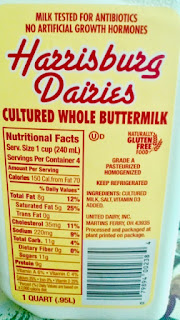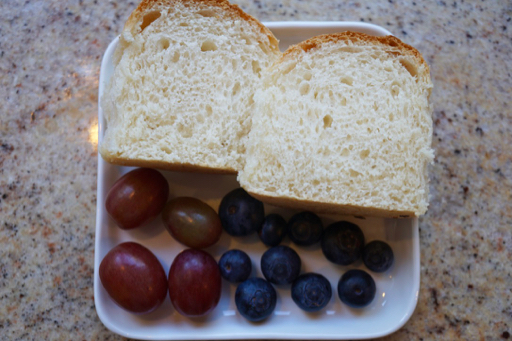My wife is very fond of buttermilk. Besides using it for baking or other cooking, she sometimes just drinks it. (A vestige of growing up in Pennsylvania Dutch country). Although I do like dishes and breads made with buttermilk, I don't enjoy just drinking it. In addition, she is very particular about the brand of buttermilk. Her favorite is Harrisburg Dairies. Our regular grocery stores do not carry this brand but Whole Foods does, so when we are in near-by Whole Foods, she stocks up by getting multiple containers. I am not sure if we can get buttermilk in Japan. Several times we looked for it but we could not find it. In any case, she made this buttermilk muffin using the recipe from "Beard on Bread" cookbook. His original recipe was for buttermilk white loaf bread however we find muffins are more convenient to take to work for breakfast. Actually my wife has made this several times but we forgot take pictures and by the time we realized there were no pictures we had finished all the muffins. After making the 1st batch my wife decided to reduce the amount of salt called for in the original recipe. The 1st batch was good but both of us felt the muffins were too salty. She found that the Beard bread recipes in general use a lot more salt than other bread recipes and the end result actually tastes salty to us. Reducing the salt also doesn't seem to make a difference in the bread. This buttermilk muffin is very similar in appearance and texture to regular white bread but it has a subtle "tanginess" or "sharpness" (in good way) somewhat reminiscent of sour dough bread but not as strong. This muffin can be served as dinner rolls or breakfast bread.
We freeze the muffins and just microwave them for 20 seconds in a silicon container for microwaving and it come back nicely with a soft texture. If you make it to a loaf, toasting it may be better.
The cut surface is that of yeast bread with nice soft texture.
Ingredients:
2 pks. dry yeast
1 tablespoon sugar (plus 1/2 tsp additional to proof the yeast)
1/2 cup warm water
4 cups bread flour
2 tsp. salt
3 tbs. melted butter
1 1/2 cups buttermilk
Directions:
Proof the yeast in the warm water and 1/2 tsp. sugar. Add the flour, remaining sugar and salt in a stand mixer with a dough hook. Add the proofed yeast, melted butter and buttermilk. Add additional flour as needed to make a smooth dough that sticks to the hook. Knead on speed 2 for 7 to 10 minutes. Place the dough in a bowl with some vegetable oil in it. Turn the dough to coat with oil so it won't dry out while rising. Let rise until doubled in bulk. Punch down and form into rolls weighing 2 1/2 oz. Put the rolls in a heavily buttered large pyrex baking dish. Cover and let rise until double in size (about 1/2 hour). Bake in a 400 degree oven for 18 to 20 minutes. (It can also be made into loaves in which case it is baked for 30 to 40 minutes or until it sounds hollow when tapped.)
My wife commented, "The first time I read the recipe the description said it was made with hard wheat flour. I thought that meant whole wheat flour. So the first few times I made the muffins I used whole wheat flour and the rolls were quite good. Then, sometime later, when I read the recipe I wondered why the title called it white bread when it was made with whole wheat flour which results in a brown colored bread. Then it dawned on me that the hard wheat flour to which they were referring was high protein white wheat flour or in laymen's terms "bread flour". (duh!!) but the recipe seems to work well with whole wheat flour too."

























